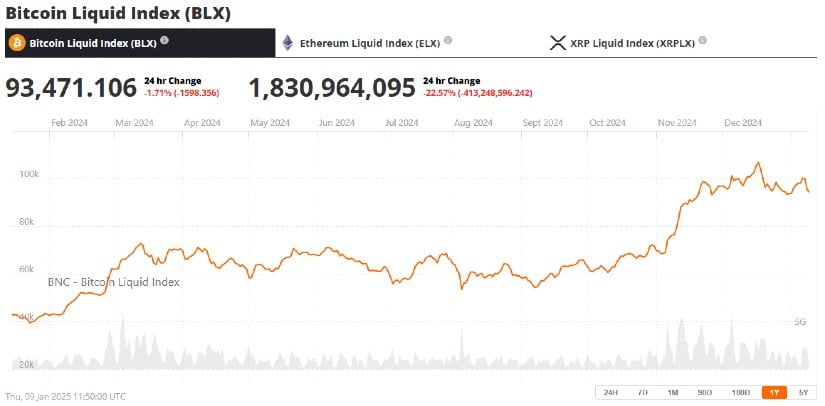The cryptocurrency market experienced a sharp downturn as Bitcoin dropped 3% to $93,471 on Thursday, losing the crucial $100,000 threshold.
The decline came in the wake of strong U.S. economic data that has reignited inflation fears, potentially delaying Federal Reserve plans to ease monetary policy. Making the siituation worse, The United States Department of Justice (DOJ) has received approval to sell 69,370 Bitcoin, valued at approximately $6.5 billion, seized from the Silk Road darknet marketplace. This decision marks the culmination of a contentious legal battle. Market participants are jumpy, if the sale goes ahead it could suppress the Bitcoin price, however some commentators suggest the sell order could be absorbed within one week.
Economic Data Sparks Market Reaction
The broader labor market saw an unexpected surge in jobs in November, indicating sustained demand, the Labor Department reported. In a separate report, the U.S. services sector grew faster in December, fueled by input prices rising to the highest in nearly two years.
Source: GreeksLive via X
These reports fueled speculation that the Federal Reserve might maintain higher interest rates for longer to curb potential inflationary pressures. Benchmark 10-year Treasury yields rose to 4.699%, their highest point since April 2024, reflecting investors’ expectations of tighter monetary policy.
“Stronger economic indicators have shifted market sentiment, with riskier assets like cryptocurrencies bearing the brunt,” said Ryan Lee, chief analyst at Bitget Research.
Crypto Market Sees Broad Declines
Bitcoin’s 5% drop to $96,602 on Wednesday led a broader crypto market sell-off, with Ethereum tumbling 8.4% to $3,373, XRP declining 3% to $2.33, and Solana losing 8% to settle at $199.36. By late Tuesday, the total cryptocurrency market capitalization fell 7.2% to $3.5 trillion.
Market analyst Ryan Lee noted that rising interest rates tend to hurt high-risk assets like cryptocurrencies as investors shift their focus to safer options such as bonds. The jump in Treasury yields has made traditional investments increasingly attractive compared to the volatile crypto market.
Mass Liquidations Amplify Volatility
The rapid price corrections triggered liquidations totaling approximately $555 million in long positions, according to CoinGlass data. These leveraged positions, which bet on price increases, were wiped out in the derivatives markets, marking the first major liquidation event of the year.
BTC ATM Volatility Term Structure. Source: GreeksLive
“This liquidation event has heightened volatility, with forced sales accelerating price adjustments,” Lee explained. “Traders are likely to reduce leverage in the short term, possibly leading to a consolidation phase or further declines depending on sentiment.”
Early 2025 Outlook for the Crypto Market
The interaction of the macroeconomic factor with market dynamics continues to influence cryptocurrency performance. Events such as Donald Trump’s inauguration on January 20 and an interest rate decision by the Federal Reserve on January 29 will probably have a greater effect on market sentiment going forward, analysts say.
Bitcoin (BTC) price chart. Source:Bitcoin Liquid Index (BLX) via Brave New Coin
The current environment really highlights the sensitivity of crypto to macro shifts,” Lee said. “While institutional adoption does continue to give a long-term bullish outlook, short-term volatility is very likely to remain.”
As these developments finally settle into the market, traders are preparing for further volatility while closely watching the economic indicators for any announcements regarding policy changes. Whether Bitcoin manages to recover above the $100,000 level greatly depends on how the overall economic narrative will come into play during the weeks ahead.














Leave a Reply